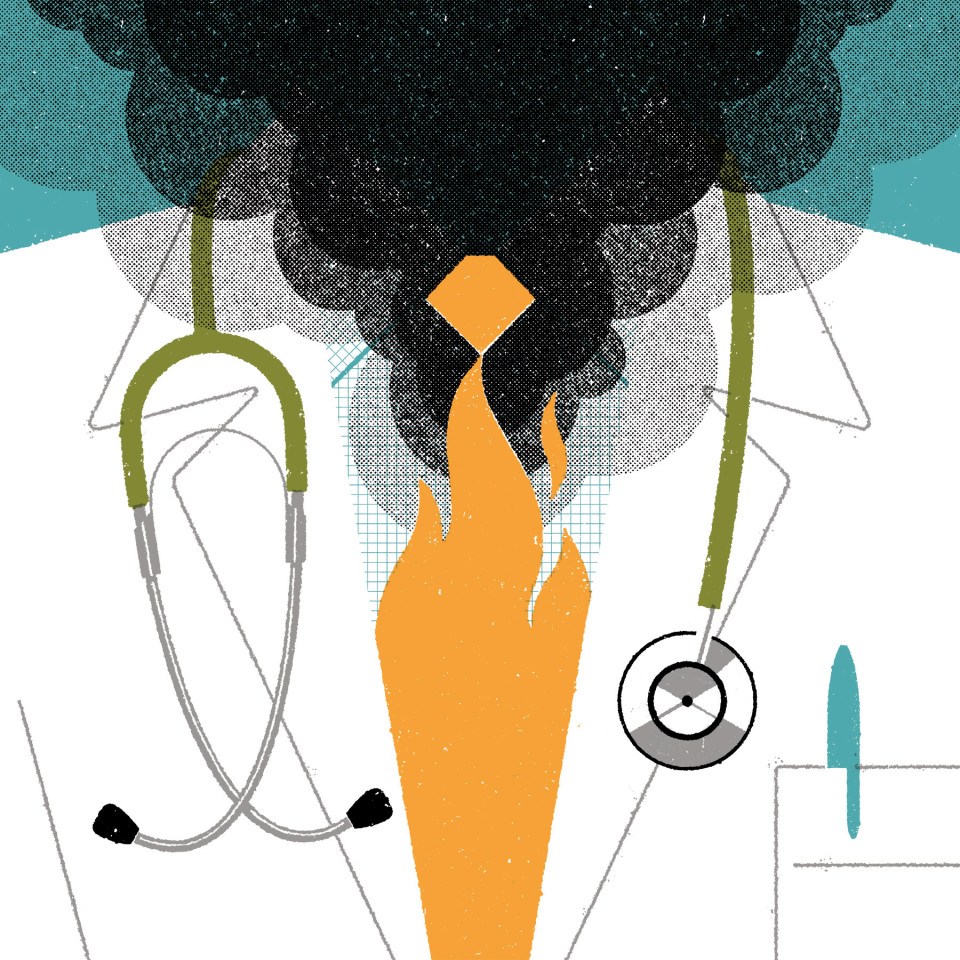Physician Burnout: The Open Secret We Need to Confront
More and more doctors are exhausted — physically, mentally and emotionally — and it’s making us all unwell.

Physician burnout / Illustration by Matt Harrison Clough
An autumn evening around a decade ago. I can remember it as vividly as last night. A Monday, one of my “triples,” the days I worked the morning, afternoon and evening shifts. I had been doing one or two triples a week for 10 years or so. This day started no differently — up at 6:30, shower, pack breakfast and lunch, coffee and water, a kiss goodbye from my wife, in the car at seven, first patient scheduled for 7:30. As usual, I hit traffic on the 20-mile drive and walked into the office five minutes late. An apology to the first patient of the day, a quick wash of the hands (of course), a smile, and then a seat.
My practice of medicine was as authentic as I was. A shirt and tie, white coat but always with the sleeves pushed up to create a casual environment, introducing myself as Andy (never “Dr. Cohen”), sitting, thanking patients for coming to see me, and then asking what was bothering them most. I had this down pat. Through 10 years of clinical practice, my patient satisfaction scores had been off the charts, and I had been recognized as a “Top Doc” multiple times. I had a reputation for making patients comfortable, making them feel heard, and giving them the time they needed.
The time they needed. Patients were scheduled every 15 minutes. Twelve a session, 24 a day, 36 on the triples. In a perfect world, a patient would come in for elbow pain, be assessed, be given a plan, and on to the next patient. In reality, Mrs. Smith* came for her diabetes, but her daughter recently had a flare-up of multiple sclerosis and was planning on moving in with her. Mr. Jones presented for his hypertension, but he wasn’t sleeping at night because of his wife’s anxiety. It was the same with Ms. Brooks, Mr. Murphy, or any of the patients I saw that day, and always. Because that’s life. That’s what a family doctor does. He listens.
And so Mrs. Smith’s appointment ran 10 minutes over, and Mr. Jones’s as well, followed by Ms. Brooks, Mr. Murphy and the others. By the time my hour lunch break came and went and all 12 patients on my morning schedule were seen, I was running 90 minutes late. This was a normal occurrence — apologizing for running late but making up for it by giving patients the time they needed. In the end, skipping my lunch break let me gain an hour, and it was a minor victory that I started my afternoon “only” 30 minutes behind.
Twelve more patients scheduled. At 1:30, I decided I had better use the restroom. Yes, it would cost me a few minutes, but you can only put off nature calling for so long. By 2:30, I decided I should force down my yogurt and granola for some calories. I was an hour behind for Mr. Duncan and his alcoholism since being laid off, an hour and a half behind for Mrs. Lloyd with her memory loss, who shouldn’t be driving, and an hour-45 for Mr. Kim and his worsening anemia and his refusal to get a GI workup. By the end of my afternoon session, I was two hours late. Working through my hour-long dinner break again let me catch up — I was only an hour behind starting my evening session.
And then it happened. Midway in, with the sun fully set and running as behind as ever, I saw her. She was a morbidly obese patient with complex mental health issues who’d managed to set herself aflame by falling asleep with a cigarette in her mouth. She spent months at a burn unit and came in for routine follow-up. I didn’t have her records, and she didn’t have her medication list. She started the conversation by asking if she should go through with her upcoming elective surgery — something not at all related to her recent hospitalization — and then handed me a form to clear her. I felt sick.
Dizziness reigned, and I had to excuse myself. In my own office, I put my head down, sweating uncontrollably. I was nauseated, but nothing like the nausea that comes with a GI bug. My medical assistant checked on me, and I thought I’d try to see the next patient, coming back to the scene of the morbidly obese burn patient a bit later. Behind door number two, frustrated that she had to wait so long, was a frail 90-year-old grandmother. She, too, was following up from the hospital, for a mini-stroke, which of all things presented as dizziness. I did my best not to fall off my chair, leaned forward, and excused myself again.
I don’t remember leaving the office that night. I don’t remember apologizing to the patients or the staff. I just ended up in my car, in the parking lot, in the dark, in the cold autumn air. Somehow, I was able to drive home. On the way, I called my wife, sobbing, and my mom, scared. I was suffocating. I knew this was anxiety, and yet I couldn’t stop it. I paced the upstairs that night and called my own doctor the next day. I had labs, an EKG, and an MRI of my brain. (There’s nothing like going inside that tube when you can’t breathe to begin with.) All normal. And yet nothing was normal.
That’s the thing about burnout. It doesn’t just call you up on a Saturday evening and say, ‘Hey, you’re really stretching yourself thin. I’m worried about you, buddy.’”
Wednesday came. Then Thursday. I met my boss at a local coffee shop and explained what happened. “Take all the time you need,” he told me. At my therapy session on Friday, I discussed the state of my life. I was considered widely successful, and yet I wasn’t able to take my kids to school. I wasn’t able to be home for dinner. I was apologizing all day to my patients. What kind of life was this? How did this happen?
That’s the thing about burnout. It doesn’t just call you up on a Saturday evening and say, “Hey, you’re really stretching yourself thin. You might want to slow down and make some changes, buddy. I’m worried about you.” Instead, it hits with the force of a mentally ill burn patient asking you to clear her for elective surgery while you’re running two hours late at 8 p.m.
Hundreds — scratch that — thousands of doctors have felt something along this spectrum: Either it’s impossible to keep up, or we’re damned for not being able to make it home for dinner, or we’re sobbing in a dark parking lot after hours. And yet we keep going. Because we’re driven — top marks in high school, all advanced classes, pushing through organic chem, missing the big game to make time to study. We’re on the road to success — good college, good medical school, good residency. And then we arrive.
Here’s the thing about arriving. If you’re good, the patients will come. The national physician shortage and the ever-aging population ensure that. And when they come, no one stops to ask, “What will you do? How will you manage? How will you find balance?”
Medicine is all-encompassing. It doesn’t mean to, but it completely sucks you in. You do your best, and you’re rewarded by more referrals, more patients. And it grows and grows. Maybe, at 28 years old, you can do a triple. But then there’s marriage, kids, sports, school … and all of the guilt. I remember a mentor of mine popping a Nexium a few days after I took my first job. “Have heartburn?” he asked. “It’s just a matter of time.”
So here we are. Let’s call it what it is. Let’s not sweep it under the rug like a dirty little secret. Burnout, in all its forms, is real. For some of us, the end has been changing careers — or, even worse, death. For many others, it’s acute dizziness, anxiety, insomnia. And for all of us, it’s “How did this happen?” Curing this pandemic isn’t something that comes easily. But we can talk about it. We can say the “B-word” without fear. We can acknowledge the elephant in the room. The more we talk, the less stigma there is.
Here are three pearls that helped me. Maybe, just maybe, they’ll help you, too:
- You have control. Don’t just keep going. Stop and evaluate what’s working and what’s not working. Write down what’s important to you and then hold those things holy. For me, it was being able to take my kids to school in the morning and being home most nights for dinner. These things aren’t gifted to you, but you can work with your colleagues to create a schedule that makes sense. If you aren’t whole, your patients most definitely won’t be.
- It’s okay to pivot. An incredible friend pointed out to me that the track I was on was a straight line: high school, college, med school, residency, practice. Boom. No forks in the road; no time for reflection. The vast majority of people are doing something different as adults than they imagined in their formative years. My friend was an engineer. Now, he’s doing HR for an engineering company. My wife was a school social worker. Now, she works with women who struggle with emotional eating and “mom issues.” Medicine is a huge field with many emerging branches and technologies. Explore them. Find what works for you. Take the chance.
- Talk about it. You aren’t in this alone. Whenever I mention that I have a family doctor, I get awkward gazes: “Why do you see a doctor?” It turns out doctors need help, too. We physicians can be the best support for our colleagues in need. No one knows like we do. No one feels like we do. Why not use our empathy for peer support?
For me, personally, while I’m no psychologist, I am a proud family doctor. My white coat is on, my sleeves are rolled up, and I’m listening. For the sake of medicine, please come in and have a seat.
*The names of patients in this article have been changed to protect the privacy of the individuals.
Published as “The B-Word” in the May 2023 issue of Philadelphia magazine.
Andrew G. Cohen is a VP of clinical operations for Virtua Health, medical director of the Virtua Integrated Network, and a practicing family physician. He is expecting to receive his MBA this month.


